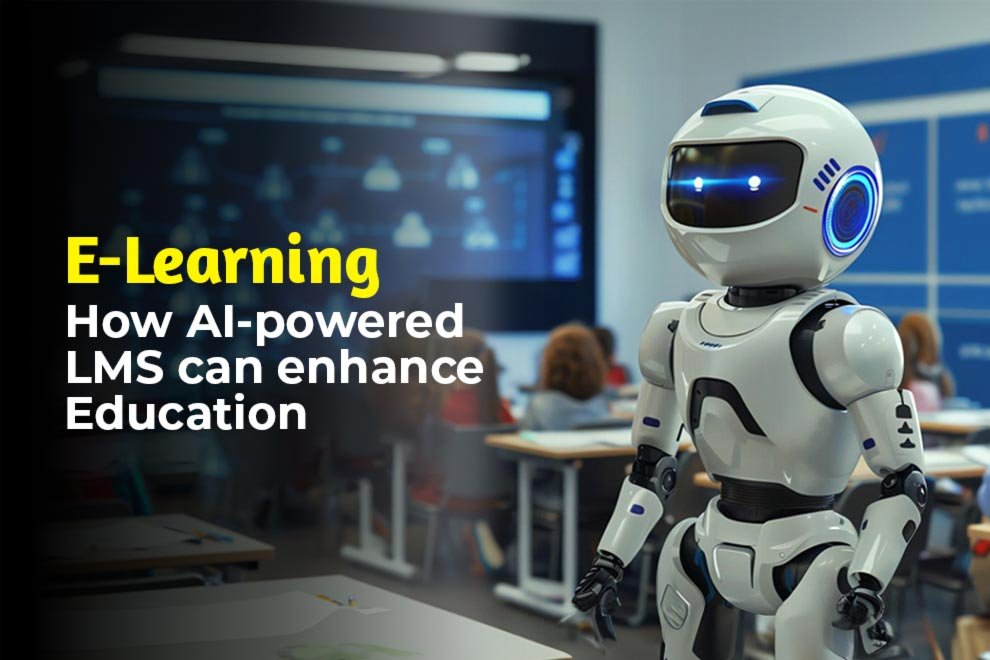AI is already impacting our everyday lives. And while we reflect on the consideration of AI, we will not assist; however, think of the notion engines at the back of the guidelines you spot on Amazon, Spotify, or Netflix.
Artificial intelligence is the backbone of these concept engines. In the context of e-learning to know and your learning management system (LMS), it would be smooth to pigeonhole a learning platform’s system learning functionalities as simply being relevant to idea algorithms.
Fortunately, AI-based LMS structures provide much extra to enhance corporate schooling packages.
If you’re puzzled by how AI does that and what to search for in an AI-powered LMS, you’re in the right place. That’s precisely what this guide is set – so let’s begin!
What is an AI-powered LMS?
An AI-powered LMS is a learning management system that carries artificial intelligence (aka system learning ) capabilities, permitting the automation and organization of your online learning environment.
These functions include automating content material management, monitoring learner progress, and coping with grades. This can result in full-size time and price financial savings.
Another essential aspect of AI-powered LMS is they facilitate more customized learning. Similarly to an advice set of rules on platforms like Spotify, AI can suggest gaining knowledge of guides to rookies primarily based on their previous pastime.
It is going past simple hints, too. Artificial intelligence may be used to create custom-designed learning pathways that adjust learning enjoyment to a learner’s wishes and preferences.
What is the role of AI in e-learning?
It’s an exciting time within the surprisingly new world of Artificial Intelligence, with new programs emerging constantly.
In e-learning, AI has transformed how corporations and learning revel in designers’ approaches to developing publications and schooling programs.
Here, we’ll look at several of the most exciting and valuable ways AI integrates into an LMS to make learning and development more green, engaging, and powerful.
1: Learning direction personalization
Online learning has revolutionized education, but like conventional learning, it does have one essential flaw. The learning of direction for all newbies is equal.
This results in predictable final results. At a few factors in the course, the material becomes too hard for some freshmen but too clean for others.
With AI, it’s feasible to customize gaining knowledge of paths based on numerous inputs that the rules can use for choice-making. So, if a learner appears to be struggling, the gadget can serve them remedial fabric in the course to assist them in apprehending the learning content better.
Conversely, an overachiever gets extra challenging and in-intensity material. The result is that each novice grows to master the concept at their tempo.
Personalization can move similarly to this; it permits multimodal studying tailor-made to the person. Some people study best when watching motion pictures, while others prefer reading.
2: Advanced analytics
Assessment is an essential part of each online training software. However, conventional assessment has a few common obstacles: time-consuming and needing more elements.
Artificial intelligence to the rescue!
One area wherein AI will always have humans beat is its capacity to procedure and examine giant quantities of records quickly. Not only that, but it could also discover patterns and developments to optimize the learning modules.
In this manner, you’ll get all the facts you need about a scholar’s overall performance: the strengths and the problem areas.
Robust AI-powered analytics features allow for better LMS metrics that help you understand how beginners and the courses are carried out.
3: Improved accessibility
The critical idea behind accessibility is that as many human beings as feasible must be capable of using something, whether or not it’s an iPhone or your online course. The more individuals can use it, the higher.
Accessibility isn’t simply important from a diversity and inclusion perspective; it also drives overall performance. The more your personnel can complete your company training applications, the more productive they can be.
AI can play a vast function in this. For instance, it can robotically translate content between different languages or add captions to films to assist people who are deaf or hard to listen to.
4: Faster course development
Developing courses is one of the most time-consuming and complex responsibilities for academic designers, and it is challenging to be counted as an expert.
While AI can’t yet automate the entire direction development manner, there are AI LMS features that could significantly velocity it up.
For example, localizing and translating your e-learning content is usually onerous, including hiring translators. Not so with AI.
AI is learning quite well at translating matters. So, there’s no longer a reason to leverage this if you’re an employer needing to create schooling materials for multiple locales.
5: Real-time assistance
Online learning to know is bendy and tasty, but what occurs when newcomers have burning questions about the cloth?
Relying on real tutors to do this is both time-eating and useless. Plus, with the upward thrust of mobile learning and remote teams, your newbies may access the content material at 3 a.m. On a Sunday.
Luckily, AI-powered chatbots don’t want to sleep. Instead, they act like real-time digital tutors who can now answer learner questions.
Now, newcomers don’t need to ask the instructor (or Google) whenever they have a question.
3 Key skills to look for in an AI-powered LMS
Artificial intelligence is already converting how agencies approach learning methods and are poised to exchange more things.
Nevertheless, “AI-based” and “AI-powered” are also marketing terms.
So, it’s an excellent concept to realize how to separate wishful questioning and lofty guarantees from what an LMS e-learning platform can do for you inside the right here and now.
These are the critical talents to search for in an LMS platform that’ll deliver the promise of AI-based online learning. Think about those capabilities when you’re thinking about your LMS implementation plan.
1: Admin mission automation
In a nutshell, AI is a computer application that may perform responsibilities that generally require human intelligence. These responsibilities include recognizing speech, language translation, facts analysis, and selection-making.
Consider all the everyday duties you perform simultaneously as imposing employee training. Imagine having a elearning platform that takes those tasks off your plate.
From robotically tagging and gaining learning of content to translating course content material into a couple of languages to suggesting courses applicable to each consumer, AI works in the experience to do the heavy lifting so you can concentrate on extra meaningful paintings.
2: Content curation & aggregation
To make informed guidelines to novices, AI must verify and curate each content material on the platform.
AI routinely sifts through content material that doesn’t apply to a learner’s adventure and places the maximum relevant and tasty content in front of them.
It learns which formats each learner prefers (from webinars to games) and curates the course style to align with what laboured first-class in the beyond.
Content curation offers some beautiful benefits for your L&D applications:
- Increases the overall value of your curriculum: a well-curated content library is a real asset because beginners can constantly get extra substances applicable to their learning enjoyment.
- It makes learning to know more attractive: shaking matters up with routinely encouraged motion pictures, podcasts, ebooks, and blogs will make things more fun than relying on course content.
- Fosters a learning way of life: curation ties into social learning and microlearning because it allows us users to effortlessly find and get entry to substances on topics that hobby them, after which proportion them with others.
3: Personalization of gaining knowledge of
The demand for customized learning is stronger than ever.
Employees need to study their phrases and have remarkable expectations for flexibility – they need interactive learning clothes that are engaging and relevant.
AI technology ensures personalized reviews for newbies by analyzing their behaviour, what publications they’ve interacted with most, and their favoured knowledge of the format.
This data allows you to recognize what’s most applicable to a learner, after which present publications tailor-made to their needs. As a result, inexperienced persons experience a more robust learning pathway.
AI makes your learning platform responsive to individual needs by adapting intelligently to their requests, increasing engagement.
Conclusion
Choosing the right AI-powered LMS is key to improving eLearning by automating tasks, personalizing learning paths, and making content more accessible. AI helps create more efficient and engaging learning experiences that meet the unique needs of your learners. As AI technology continues to grow, it will become even more important in shaping the future of corporate training. If you’re looking for a solution that fully uses this technology, Codiste offers custom eLearning development to help you build an AI-driven learning platform tailored to your specific needs.
Also Read: The Importance of Title IX in Texan Educational Institutions










